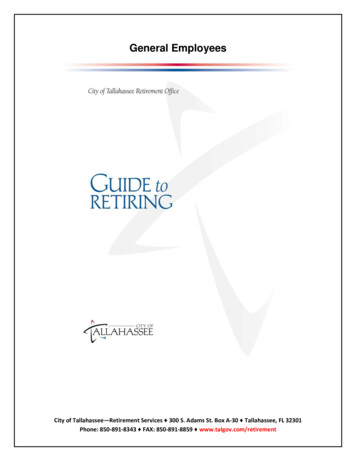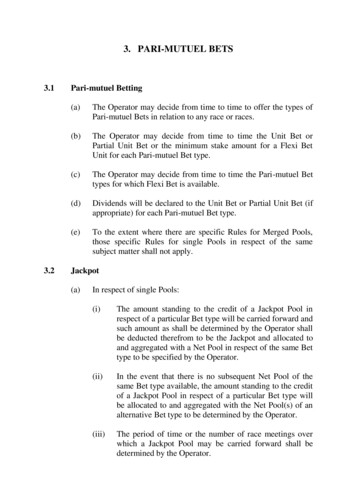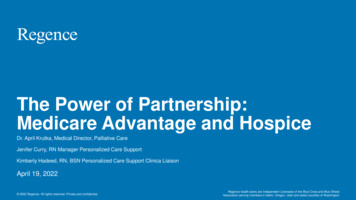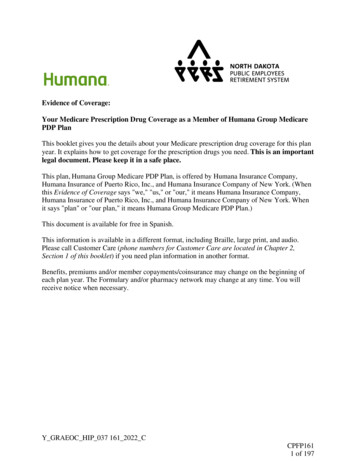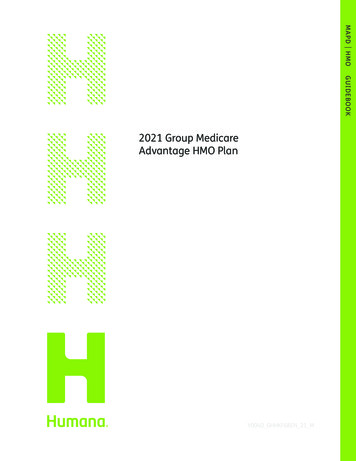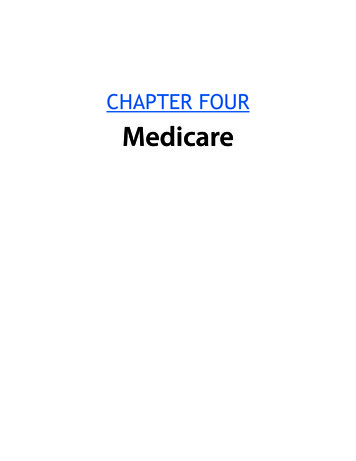
Transcription
CHAPTER FOURMedicare
TTABLE OF CONTENTSINTRODUCTION 1ELIGIBILITY 2ENROLLMENT IN MEDICARE 5COVERED SERVICES 6HOSPITAL DISCHARGE PLANNING 15MEDICARE MANAGED CARE ORGANIZATIONS 18MEDICARE PART A & B APPEALS 22MEDICARE ADVANTAGE MANAGED CARE APPEALS 25EXPEDITED APPEALS PROCESS FOR MEDICARE ADVANTAGEMANAGED CARE ENROLLEES 27CLAIMS PROCESSING 28PRIVATE MEDICARE SUPPLEMENTAL INSURANCE 29PROGRAMS TO HELP LOW-INCOME MEDICARE BENEFICIARIESWITH MEDICARE COSTS 31SUPPLEMENTAL MATERIALS 33
TChapter Four: MedicareINTRODUCTIONWhat is Medicare?Medicare is a federal health insurance programthat is a primary source of coverage for adults65 and over as well as certain individuals withdisabilities. Eligibility is usually based on thework history of an individual or the individual’sspouse. (Some individuals may qualify evenwithout a work history: if they are low income,they may get premium assistance, and if not,they may pay privately). Individuals must beeither U.S. citizens or legal permanent residentswho have lived in the U.S. for the last fiveyears.Medicare does not cover all medical needs, andmost beneficiaries have additional insurance(Medi-Cal, a private supplement, etc.). Thereare four “Parts” to Medicare: A, B, C & D.Medicare PartsA, B, C & DThere are four “Parts” to Medicare. Part Aand Part B are referred to as “original feefor-service” Medicare, while Part C is aprivate version of Medicare called “MedicareAdvantage.” Part D is prescription drugcoverage, and is discussed in Chapter 5.Low income individuals may qualify for specialprograms to assist with Parts A/B/C (see 4-31),and/or for the Low Income Subsidy for Part D(see Chapter 5).Medicare Part A is commonly known as“hospital insurance.” Under certain conditions,Medicare Part A pays for a stay in a hospital ornursing home, or pays for certain expenses ofhome health care. In addition, Medicare PartA pays for certain expenses of hospice careprovided to a terminally ill person.Medicare Part B is commonly known as“medical insurance.” Medicare Part B paysfor certain expenses of physician services,therapies, tests, x-rays, and medicalequipment. Under some circumstances,Medicare Part B will pay for particular servicesprovided in a nursing home or for home healthcare.Medicare Part C is Medicare Advantage, analternative to fee-for-service Medicare. Itis a system where Medicare pays a privateplan to manage a beneficiaries’ health care.Medicare Part C coverage can include healthmaintenance organizations (HMOs); preferredprovider organizations (PPOs); private feefor-service plans (PFFs); special needs plans(SNPs); and medical savings accounts (MSAs).Medicare Part D is the Medicare PrescriptionDrug program, which began in 2006. Each year,prescription drug plans participating in theprogram are announced for the following year.Enrollment runs from October 15 to December7 each year. A low income subsidy is availablefor those who qualify; applications for thesubsidy are processed by Social Security.You can read more about Medicare Part D inChapter 5.Ch.4 Pg.1
TChapter Four: MedicareELIGIBILITYMost individuals are eligible for Medicare PartA based on their work history. However, someindividuals may be eligible without this history.Part A Eligibility WithPremiumPart A Eligibility WithoutPremiumIf, due to an insufficient work history, anindividual is not eligible automatically for PartA coverage, he nonetheless may be able topurchase Part A coverage. To purchase Part Acoverage, he must be:In general, eligibility for Medicare Part A isbased on the work history of an individual orthat of his or her spouse. In the most commontype of eligibility, someone is at least 65 yearsold, and either the individual or spouse has awork history that creates an entitlement toSocial Security retirement benefits (usually 40quarters, or the equivalent of 10 years of workhistory).Part A eligibility is also available to personswho have been receiving Social Securitydisability benefits or railroad retirementdisability benefits for at least 24 months. Forpeople with end-stage renal disease (kidneyfailure) or ALS (“Lou Gehrig’s Disease”), the24-month waiting period is waived.1. at least 65 years old;2. either a U.S. citizen, or a permanentresident who has lived continuously inthe United States for the previous fiveyears; and3. enrolled in Medicare Part B (by payinga further premium).The 2017 premium for Medicare Part A is either 227 or 413 monthly, depending on workhistory. Note: Low income individuals may beeligible for premium assistance and will nothave to pay these premiums. See below.Married individuals, including those in samesex marriages, can qualify for Medicare PartA coverage based on a spouse’s work history.Certain divorced individuals, widows, andwidowers can also rely on their spouse’searnings record. Eligibility does not extend tothose in civil unions or domestic partnerships.Those who do not qualify automatically forPart A may choose to purchase only Part Bcoverage. However, as explained above, anindividual wanting to purchase Part A coveragemust also enroll in Part B.Ch.4 Pg.2
TChapter Four: MedicarePart B EligibilityPart B DeductibleMedicare Part B coverage is available toanyone who is eligible for Part A benefits,and/or is at least 65 years old and either aU.S. citizen or a permanent resident who hasresided in the United States for the five yearsprior to enrollment for Part B.The beneficiary is responsible for a yearlydeductible of 183 in 2017.Those receiving Medicare Part B coveragemust pay a monthly premium— 134 for 2017.The premium is deducted from the enrollee’sSocial Security, Railroad Retirement or CivilService retirement, or disability payment.Medicare will send a bill every three monthsto enrollees who do not receive any of theseretirement benefits.People who do not qualify for automatic PartA eligibility may choose to purchase only PartB coverage. However, as explained in thediscussion of “Part A Eligibility with Premium,”to purchase Part A coverage, they must alsopurchase Part B coverage.NOTE: People with incomes above 85,000 foran individual or 170,000 for a couple willbe required to pay a monthly surcharge totheir Part B and Part D premiums called theIncome-Related Monthly Adjustment Amount,IRMAA.Part B Co-Payment:20 PercentMedicare Part B payments can be made eitherto the beneficiary or the health care provider(physician, hospital, etc.). In general, if aprovider accepts the Medicare approvedamount as payment in full, Medicare willpay 80% of the cost to the provider, and thebeneficiary is responsible for the other 20%.If the provider does not limit the costs of theservices to the Medicare approved amount,Medicare will pay the claim to the beneficiaryand the beneficiary will be responsible for thefull payment to the provider, unless a limitingcharge applies. Limiting charges apply only tophysician and therapist services.A more detailed explanation of the Part B copayment, including an explanation of the PartB “limiting charge,” is set forth later in thischapter.Medicare Part B enrollment is not automatic for many people turning 65. Those whohaven’t started receiving Social Security or other federal retirement benefits need tocontact the Social Security Administration to start their Part B coverage.Ch.4 Pg.3
TChapter Four: Medicare2017 Alert: For a limited time, CMS is offering “equitable relief” to somepeople who were enrolled in Covered California plans with subsidies and thenbecame eligible for Medicare. Many did not sign up for Part B when theyshould because they thought, incorrectly, that their subsidies for CoveredCalifornia plans would continue. As a result, they incurred late enrollmentpenalties. They can now file a request with the Social Security Administrationto remove the Part B penalty. Details are available at able-Relief-Fact-Sheet.pdf . The deadline isSeptember 30, 2017.Ch.4 Pg.4
TChapter Four: MedicareENROLLMENT IN MEDICAREPart A EnrollmentEnrollment is automatic for individuals whoat age 65 have started receiving benefitsfrom either Social Security or the RailroadRetirement Board. For people who becamedisabled prior to age 65, enrollment iseffective two years after the start of SocialSecurity disability benefit eligibility, althoughthe two-year waiting period is waived if thedisability resulted from kidney failure or ALS.An individual who does not begin receivingretirement benefits until after age 65 mustapply for Medicare benefits when he turns 65.He may apply during the seven-month “InitialEnrollment Period”, which begins three monthsbefore the month of his 65th birthday andends three months after the month of his 65thbirthday.Most people enrolled in Covered Californiaplans will lose their subsidies when they turn65. They should promptly enroll in Medicareto avoid high premiums or coverage gaps.Part B EnrollmentThere are three enrollment periods forMedicare Part B.Initial Enrollment Period: If an individual isturning 65 and has not yet applied for SocialSecurity or Railroad Retirement benefits, orMedicare Part A, he can enroll in Part B duringthe seven-month Initial Enrollment Period,which begins three months before the monthof his 65th birthday and ends three monthsafter that month.General Enrollment Period: If the InitialEnrollment Period has passed, an individualmay sign up during the General EnrollmentPeriod. The General Enrollment Period runsfrom January 1 to March 31 each year. Coverage starts on July 1 of the yearenrolled.Penalty for Late Enrollment The cost of the premium will rise by10 percent for each 12-month periodin which someone who was eligiblefor Part B coverage did not enroll,except in special cases. This increasewill apply as long as the individualreceives Part B coverage.Special Enrollment Period: This period isavailable to an individual who waited to enrollin Part B because he and/or his spouse wasworking and had group health plan coveragethrough an employer or union. He can signup any time while still covered by the grouphealth plan, or during the eight monthsfollowing the date that the group health plancoverage ends, or employment is terminated,whichever comes first. People who qualify forthis special enrollment period are not assesseda penalty for late Medicare enrollment.Note: With federal recognition of marriageequality, this special enrollment period isnow available to same-sex spouses. It is notavailable to people with employer coveragebased on a civil union or registered domesticpartnership.Ch.4 Pg.5
TChapter Four: MedicareCOVERED SERVICESInpatient Hospital CareUnder Medicare Part ANursing Home Care UnderMedicare Part A1Medicare covers up to 90 days of hospitalservices in each benefit period, including asemi-private room, meals, general nursing,and other hospital services and supplies.Medicare does not cover private duty nursing,a television or telephone in the room, ora private room (unless the private room ismedically necessary). Medicare also will coveran additional 60 “lifetime reserve” days, eachof which can only be used once.IntroductionA “benefit period” (or “spell of illness”)begins when the beneficiary is admitted to thehospital and ends when the beneficiary for 60consecutive days has been out of the hospitaland has not received Medicare-covered care ina nursing home.For each benefit period, the beneficiary pays: No more than 1,316 for a hospitalstay of 1-60 days; 329 per day for days 61-90 of ahospital stay; and 658 per day for days 91-150 of ahospital stay.Specialized FacilitiesUnder Medicare Part AMedicare covers care in a specialized facility- such as a rehabilitation hospital or apsychiatric facility - for up to 190 days during abeneficiary’s life.Many clients (and some advocates) aresurprised by the very limited availability ofMedicare Part A reimbursement for nursinghome expenses. It is important to keep in mindthat the Medicare program was never intendedto be a comprehensive health insuranceplan. For example, a general exclusion in theMedicare law forbids Medicare payment for anyservice or item deemed “custodial” in nature.Maximum Duration of PaymentsAt most, Part A of the Medicare programpays for 100 days of nursing home care perbenefit period, and only the first 20 days arepaid in full. During days 21 through 100, thebeneficiary must pay a daily co-payment of 164.50 in 2017.Qualifying Hospital StayMedicare Part A may pay for a beneficiary’snursing home stay only if he has enteredthe nursing home within 30 days after beinghospitalized in a hospital for at least threenights. Generally, the resident must beginreceiving the Medicare-qualifying level of care(see below) within this 30-day period, althoughthere is an exception if that level of care wasnot “medically appropriate” until after theexpiration of the 30-day period.1 This guide’s discussion of Medicare payment for nursinghome care is taken in part from the Nursing HomeCompanion (Bet Tzedek Legal Services) and ChapterEight of Eric M. Carlson, Long- Term Care Advocacy(Matthew Bender & Co.).Ch.4 Pg.6
TChapter Four: MedicareAdvocates should also be aware thatsometimes, although an individual has spentthree nights in a hospital, part or all of thattime may not count for a qualifying hospitalstay because the individual was in “observationstatus” and not considered to be an admittedpatient. Hospital expenses for patients inobservations status are treated as outpatientexpenses and covered under Medicare PartB, which usually means that the individualpays more than if she were admitted as aninpatient.Starting in March 2017, hospitalsnow must give a notice, calleda MOON Notice, to patients inobservation status for more than24 hours. The notice includes anexplanation of why the patient isin observation status and how itaffects Medicare benefits.Level of CareMedicare Part A pays nursing home chargesonly for residents who need “skilled nursing orskilled rehabilitation services.” For example,“skilled” nursing services (as defined bythe Medicare program) include intravenousfeeding, the treatment of widespread skindisorders, and the monitoring of residents whorequire relatively sophisticated evaluations.“Skilled” rehabilitation services include, forexample, “range of motion” exercises, servicesprovided by a speech pathologist, and physical,occupational, and speech therapy.Note that a resident may qualify for MedicarePart A payment of his nursing home charges ifhe requires only one “skilled” service. Notealso that the “skilled” services mentioned inthe preceding paragraph are examples only.The Medicare regulations clearly state that avariety of conditions may qualify a residentfor Medicare Part A payment of nursing homecharges.Remember: Reimbursement cancontinue for therapy even if theresident is not “improving,” if thetherapy is medically justified.For residents receiving therapy, nursing homesfrequently – but falsely– claim that MedicarePart A cannot pay unless a resident’s conditionis improving. Actually, prescribed therapycan justify Medicare Part A reimbursementeven without current progress, if progress canbe reasonably expected in the foreseeablefuture, or if therapy is necessary to maintain aresident’s condition.It should be noted, however, that most longterm residents of nursing homes are notreceiving “skilled” services as defined byMedicare. The Medicare regulations state thatthe need for routine personal care servicessuch as administration of medications, themaintenance of catheters, and the turningof residents does not qualify an individualfor Medicare Part A payment of nursing homecharges.Determining Level of CareThe nursing home makes the initial decisionon whether a resident is qualified for MedicarePart A payment of nursing home charges.Consequently, a resident or family memberimmediately and consistently should emphasizethe “skilled” services required by the resident.Ch.4 Pg.7
TChapter Four: MedicareIf at any time (including the time of admission)the nursing home decides that the resident isnot qualified for Medicare Part A payment ofnursing home charges, the nursing home mustgive the resident written notice of the nursinghome’s decision. If the resident or familymember feels that the resident is qualifiedmedically for Medicare Part A payment ofnursing home charges, and thus disagrees withthe nursing home’s decision, the resident orfamily member may appeal the nursing home’sdecision. The resident or family memberbegins the appeal by returning the writtennotice to the nursing home after checking abox that states:Yes. I want to receive these items or services.I understand that Medicare will not decidewhether to pay unless I receive these itemsor services. I understand you will notify mewhen my claim is submitted and that youwill not bill me for these items or servicesuntil Medicare makes its decision. If Medicaredenies payment, I agree to be personally andfully responsible for payment. That is, I willpay personally, either out of pocket or throughany other insurance that I have. I understandthat I can appeal Medicare’s decision.While the Medicare program considers anappeal of a nursing home’s decision, thenursing home cannot bill the resident forthe nursing home charges in dispute. If theMedicare program eventually agrees with thenursing home and concludes that the residentwas not qualified medically for Medicare Part Apayment of nursing home charges, the residentor family member can appeal the Medicareprogram’s decision as well. During this secondappeal, however, the nursing home can bill theresident for the charges in dispute.If a nursing home fails to provide a residentor the resident’s family members with therequired notice, a resident or family membershould request in writing that the nursinghome submit a bill to Medicare Part A, evenif the resident’s medical condition may notmeet the requirements described earlier inthis chapter. Under Medicare law, a nursinghome’s failure to give adequate notice mayexcuse the resident from paying the chargesincurred during certain weeks or months, if theMedicare program finds that the resident couldnot have known that Medicare Part A would notbe covering the charges incurred during thattime period.Ch.4 Pg.8
TChapter Four: MedicareHome Health Care UnderMedicare Part AThe Basics of Home Health CareHome health care is skilled care that isprovided at the beneficiary’s home, ratherthan in a nursing home. The home may be aresidential care facility for the elderly or asimilar facility.If skilled care is required, other non-skilledservices may be provided as well.The Medicare home health benefit may includethe following services or supplies: Skilled nursing care on a part-time orintermittent basis; Physical, speech and/or occupationaltherapy; Home health aide services on a parttime or intermittent basis; Medical social services; Medical supplies (not including drugs);and Medical equipment.The Medicare home health benefit does notpay for:Beneficiary Must Be HomeboundHome health care can be provided only tothose beneficiaries considered “homebound,”based on the reasoning that those who arenot homebound can travel to a hospital orclinic for routine health care. A beneficiary isconsidered “homebound” if leaving the homeis a very difficult process. In determiningwhether a beneficiary qualifies as “homebound,” the beneficiary is not penalized forleaving home to receive health care treatmentor to attend an adult day care program.Also, attending religious services does notlimit a beneficiary’s ability to be consideredhomebound.A beneficiary can be considered“homebound” even if he leaves thehouse on occasion.Part-Time or Intermittent CareMedicare will provide home health care only ifthe need for skilled nursing care is part-timeor intermittent. This means that care is givenless than seven days a week, or less than eighthours a day, with no more than 28 hours perweek (although this may be increased to 35hours on a case-by-case basis). Around-the-clock care at the home; Prescription drugs; Home-delivered meals; Shopping, cleaning or laundry service;or Transportation.Ch.4 Pg.9
TChapter Four: MedicareSkilled ServicesNo Deductibles or CopaymentsThe nursing care or therapy services must be“skilled.”Medicare pays the full amount of all coveredservices, with a very limited exception: fordurable medical equipment only, the beneficiaryis responsible for 20% of the approved amount.Nursing care is considered “skilled” if anursing service requires the expertise of alicensed nurse. For example, treatment ofa wound and administration of an injectionare skilled nursing services that qualify forMedicare reimbursement. On the other hand,bathing and helping with dressing are servicesthat do not qualify as “skilled” services. Fortherapy services to be considered “skilled,”the expertise of a licensed physical therapistor certified speech therapist must berequired.If “skilled” care is required, the skilledcare can be accompanied by “unskilled”personal care assistance.Home Health AideIf a beneficiary requires skilled nursingservices or skilled therapy, the Medicare homehealth benefit may also be able to provide thepart-time assistance of a home health aide, asappropriate given the beneficiary’s care plan.A home health aide is a health care workerwho doesn’t have a nursing license. At least75 hours of training is required. Home healthaides help with non-medical care such asbathing, dressing, or exercising.If a Home Health Agency Believes that MedicareWill Not PayIf a home health agency believes that Medicarewill not pay for services, and as a result decidesto deny or cut back care, the home healthagency first must give the beneficiary a HomeHealth Advance Beneficiary Notice (ABN).This notice must explain why the home healthagency believes that Medicare won’t pay for theservices, and must describe how the beneficiarycan contest the agency’s decision.Forcing a Home Health Agency To Bill MedicareIf a beneficiary is given a notice of noncoverage, the beneficiary may require that thehome health agency bill the Medicare program.The bill submitted by the agency is called a“demand bill.”When a demand bill has been submitted,the home health agency still can require thebeneficiary to pay in advance for the servicesfor which Medicare has been billed.If the Medicare program subsequently pays forthose services, the home health agency mustreimburse the beneficiary.Authorization of ServicesAppealA physician must order home health care, anda care plan must be developed. Care must beprovided by a Medicare-certified home healthagency.When the Medicare program denies paymentof a bill (including a demand bill), the noticewill contain instructions for filing an appeal.The appeals process is described later in thischapter, starting on page 4-25.Ch.4 Pg.10
TChapter Four: MedicareHospice Care UnderMedicare Part AWhat Is Hospice?Hospice care is specialty care for terminallyill individuals and their families. Hospice careincludes both medical care and counselingservices. Hospice care focuses on keepingthe resident comfortable – physically andemotionally – and does not attempt to curethe illness that is expected to cause thebeneficiary’s death. For example, a hospiceprogram might put extra emphasis on painreduction, supportive services, and/or respitecare.Eligibility for Hospice CareA Medicare recipient who is terminally ill –i.e., certified by a physician as likely havinga life expectancy of no more than six months– may elect to receive hospice care underMedicare Part A, in exchange for waiving hisright to receive treatment under Part A for theterminal condition. The beneficiary retainshis right to Medicare funding for medicalconditions other than the terminal condition.At any time, the beneficiary may elect to leavehospice and return to original Medicare.A beneficiary is entitled to two 90-day periodsof hospice care, and an unlimited number ofsubsequent periods of 60 days each. For eachperiod, he must be certified by a physician asbeing terminally ill.Very Limited Cost to BeneficiaryHospice care has no deductibles and verylimited co-payments. A beneficiary pays a fivepercent co-payment for outpatient drugs andinpatient respite care.What Services Are Provided?The Medicare hospice benefit is similar to thehome health benefit, and covers the followingservices: Physician services; Nursing services; Medical equipment; Medical supplies; Medication for symptom control andpain relief; Short-term hospital care; Home health aide and homemakerservices; Physical, speech and occupationaltherapy; Social worker services; Dietary counseling; and Grief and loss counseling for thepatient and the family.The inpatient care is used for pain control,chronic symptom management, and/orproviding a respite to regular caregivers.Hospice care can continue indefinitely, as long as a physician continues to certify thatthe beneficiary is expected to die within the next six months.Ch.4 Pg.11
TChapter Four: MedicareCare Plans and ServicesThe hospice works with the beneficiary andthe physician to form an individualized planof care. Hospice care may be provided bya physician, a nurse, counselors and clergymembers, social workers, home health aides,and trained volunteers.Where Is Care Provided?Hospice services mostly are provided wherethe beneficiary is living, whether thebeneficiary is living in a house, apartment,assisted living facility, or nursing home.Inpatient care is available for pain controland chronic symptom management. Also, forperiods of no more than five days at a time,the Medicare hospice benefit may coverinpatient care to give at-home caregivers arespite from the rigors of caregiving.Services Covered UnderMedicare Part BPart B covers a wide range of medical servicesand supplies, including (but not limited to) thefollowing: Annual wellness visit with nodeductible or co-pay; Physician services; Outpatient hospital services; Home health care; Outpatient physical therapy, speechtherapy, and occupational therapy; Psychologist and clinical social workerservices; Durable medical equipment(wheelchairs, walkers, braces, oxygenequipment, etc.)*; Medical supplies (ostomy bags,surgical dressings, splints, etc.)*; Artificial limbs*; Ambulance services; X-rays; Laboratory and other diagnostic tests; Immunosuppressive drugs; Pneumonia and Hepatitis B vaccine(no co-pays); Flu vaccine (no co-pays); Diabetes self-management trainingand supplies; Glucose monitors and testing strips;Ch.4 Pg.12
TChapter Four: Medicare Annual glaucoma screening forbeneficiaries at a high risk forglaucoma; Pap smears and pelvic exams onceevery two years, or annually for highrisk women; Yearly mammograms for women age40 and above (for those 35-39, onebaseline mammogram); Annual prostate cancer screening testfor men age 50 and above; and Colorectal cancer screening forbeneficiaries age 50 and above.*Special rules apply in the Competitive Biddingprogram for durable medical equipment,prosthetics, orthotics, and supplies in all orparts of many California counties. These rulesalso apply to those who travel to other areasin the U.S. covered by the Competitive BiddingProgram. See www.medicare.gov/supplier for alist of suppliers searchable by zip code.No Co-Payment for SomeServicesServices Not CoveredUnder Medicare Part BMedicare Part B does not offer comprehensivecoverage of health care services. Among thoseservices and items not included in the Part Bbenefit are the following: Dental services; Eye glasses or contact lenses (exceptas a follow-up to cataract surgery);and Hearing aidsThere are no out-of-pocket costs for awide range of preventive services, such asscreenings for various cancers (includingbreast, colon, prostate, and cervical), heartdisease, osteoporosis, glaucoma and diabetes,and for mammograms.Medicare allows a provider to charge abeneficiary for a missed appointment aslong as the provider has the same policy forall patients, not just those with Medicare.No co-payment is required for clinicallaboratory services such as blood tests andurinalysis. Also, no co-payment is required forhome health care, with the exception of the20% co-payment that a beneficiary is requiredto pay for durable medical equipment providedas a part of the home health care. Also, thereare no out-of-pocket costs for a wide range ofpreventive services such as an annual wellnessvisit, screenings for prostate cancer, glaucoma,diabetes, and mammograms.Ch.4 Pg.13
TChapter Four: MedicareSubmission of Medicare PartB ClaimsRefusing to AcceptAssignmentPart B claims must be submitted by a MedicarePart B provider. The beneficiary generally doesnot submit these claims directly to the Medicare carrier. The time limit for submitting aclaim to Medicare generally is the close of thecalendar year after the year the services wereprovided.When a provider does not accept anassignment, the beneficiary is liable for the20% co-payment plus the amount by whichthe provider’s charge exceeds the Medicareapproved amount. The beneficiary pays theprovider directly and Medicare will pay thebeneficiary rather than the p
Medicare Part B is commonly known as "medical insurance." Medicare Part B pays for certain expenses of physician services, therapies, tests, x-rays, and medical equipment. Under some circumstances, Medicare Part B will pay for particular services provided in a nursing home or for home health care. Medicare Part C is Medicare Advantage, an





